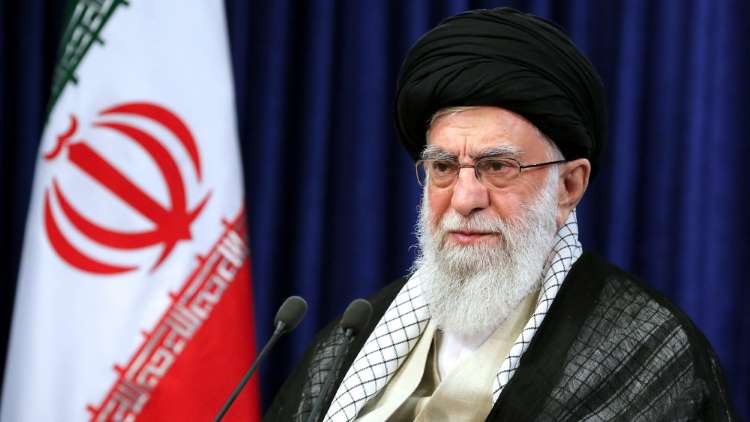Imam Khomeini (ra) shattered superpowers’ aura of invincibility: Supreme Leader
Leader of Iran's Islamic Ummah and Oppressed Imam Ayatollah Seyyed Ali Khamenei has commemorated the founder of the Islamic Republic Imam Khomeini on the 31st anniversary of his passing, saying the late leader shattered the presumed invincibility of superpowers.

In a televised address to the Iranian nation, Ayatollah Khamenei paid homage to the late revolutionary leader and recounted his legacy.
Decades after his departure, Imam Khomeini “is still alive among us, and should remain so.”
The Leader recalled how Imam Khomeini also transformed the people’s attitude towards the so-called superpowers and their presumed invincibility to the point that the then US rulers acknowledged that the Imam had “humiliated” them.
“Imam, those who worked for him, and the youths who would mobilize at a wave of his hand, humiliated the superpowers in the true sense of the word, broke down their will, and ousted them from the stage,” the Leader stated.
“At that time, no one assumed that anything could be done contrary to what the US willed. Imam Khomeini proved that superpowers are not invincible. We witnessed what happened to the Soviet Union. And today we are watching the US and see what is transpiring there,” Ayatollah Khamenei said, adding Imam Khomeini taught the masses how these big powers can be overcome.
The Leader also addressed the far-and-wide protests that have engulfed the United States in the aftermath of the gruesome killing of African American citizen George Floyd at the hands of a white police officer in Minneapolis.
Ayatollah Khamenei said what the US has come face to face with today in the form of the protests “is a result of the realities that had always been kept concealed,” and have now risen to the surface causing disgrace for the American administration.
The brutality that was exercised on Floyd is what the United States has been sowing all around the world, the Leader stated, saying, “They have done the same in Afghanistan, Iraq, Syria, Vietnam, & many other countries.”
“This is the US government’s nature and character that is being exposed today.”
Ayatollah Khamenei referred to the “I Can’t Breathe” slogan that the American protesters were chanting all across the United States during the protests and called it ”the heartfelt words of all nations against which the US has committed many atrocities.”
As another instance of the US disgraceful behavior, the Leader cited Washington’s mishandling of the coronavirus’ outbreak, even though the country came to grips with the disease later than other nations.
Ayatollah Khamenei pointed out that Washington has been treating Americans in the worst possible manner, saying the people of the United States have every right to feel embarrassed and ashamed of their administrations, particularly the current one.
The Leader underlined the Imam’s spirit of “seeking and encouraging change,” calling him a “true leader.”
From a young age, Imam Khomeini would advise in favor of “rising up in the path of God,” Ayatollah Khamenei noted, and reminisced how the late leader would invoke “spiritual revolution” among people through his speeches.
The Leader recalled how Imam Khomeini would endeavor towards galvanizing and revolutionizing the youth. He valued the change that was effected by the Revolution among the young people more than the defeat of the despotic monarchy because the change that was created among the youth manifested “the defeat of Satan,” Ayatollah Khamenei stated.
Imam Khomeini thus managed to eventually bring about “change across the whole Iranian nation,” and prompted the people to abandon the spirit of lethargy and capitulation in the face of oppression, the Leader stated.
Iran’s Islamic Revolution “did not deviate from this pro-change approach” even after Imam’s departure, the Leader said, citing various instances of progress and transformation across the country’s various areas in the post-Revolution era.
“We underwent change in various areas and became more powerful than before,” Ayatollah Khamenei stated.
The revolutionary attitude is still alive today, said the Leader, citing the country’s scientific and defensive achievements and noting that Iran has attained the “deterrent status” thanks to its defense power.
Unlike now, the country’ scientific standing was negligible under the monarchical rule, the Leader noted.
In the political sphere too, the country now portrays an “imposing image of itself in the world,” Ayatollah Khamenei observed.
The Leader then proceeded to name instances of desired change in certain arenas.
As one desired prospect in the field of economy, the Leader cited potential severance of dependence on oil revenues.
Across the social sphere, the Leader sternly warned against allowing the population’s median age to rise.
Imam Khomeini also caused the nation to abandon its feelings of self-deprecation and consider itself entitled to self-esteem, and extended the nation’s attitude towards religion beyond a simply personal matter, Ayatollah Khamenei remarked.
Grand Ayatollah Seyyed Rouhollah Mousavi Khomeini passed away on June 3, 1989 at the age of 87. Hailed as one of the Twentieth Century’s true revolutionary leaders, he spearheaded the Islamic Revolution — the Iranian nation’s struggle against the tyrannical United States-backed Pahlavi monarchy — towards eventual victory in 1979.







